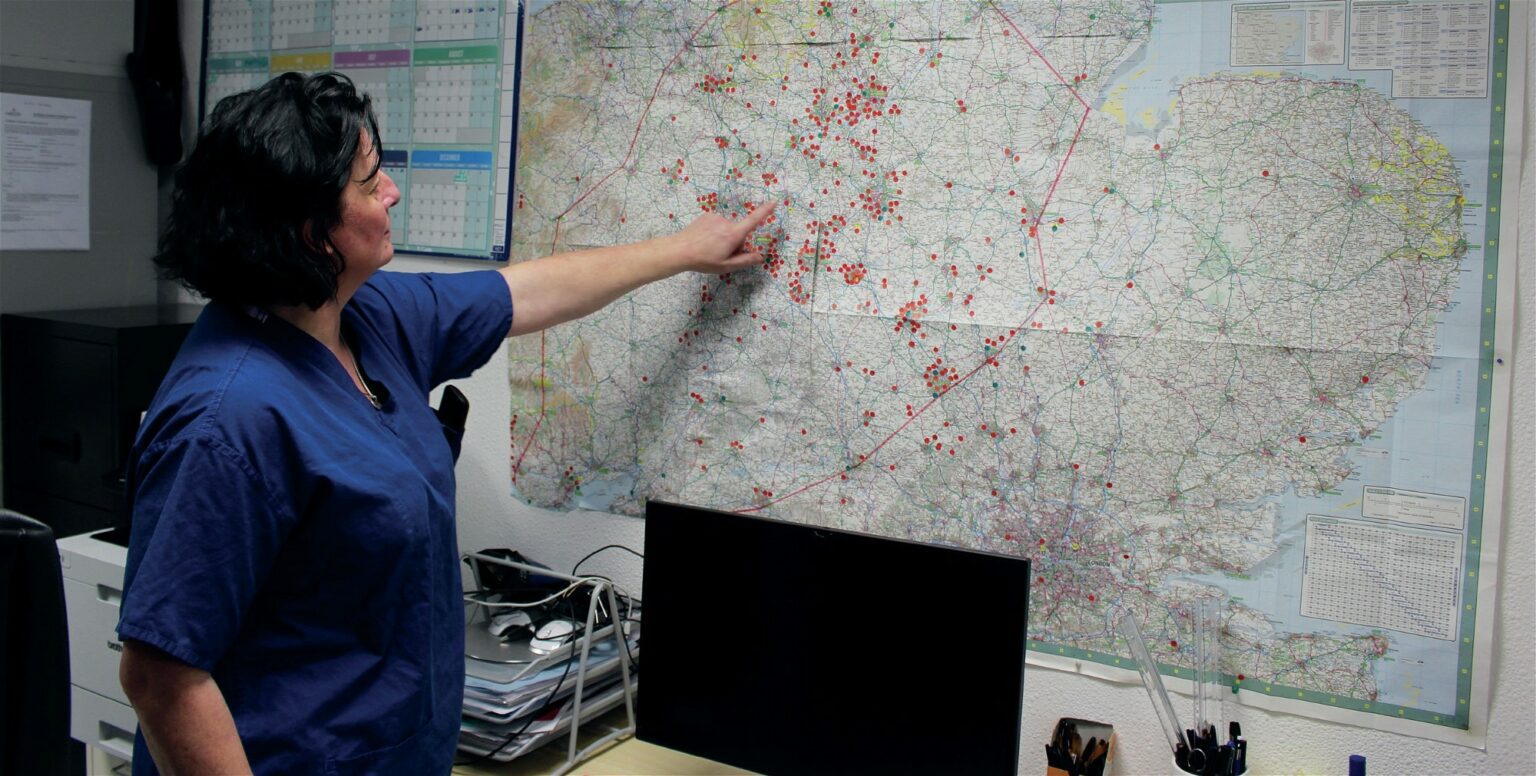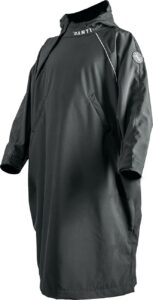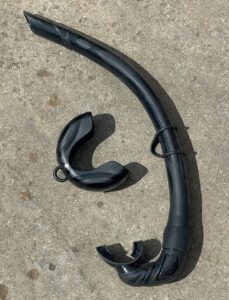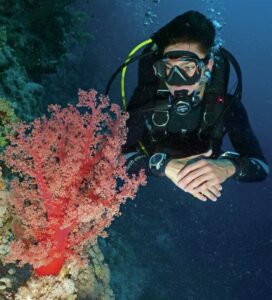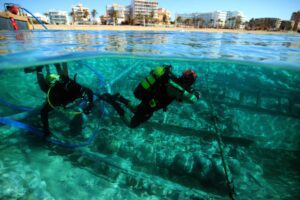The Midlands Diving Chamber is one of the busiest chambers in the UK, not only working with divers suffering from DCI, but also treating all manner of other issues, including skin grafts and radiation tissue damage. Mark Evans went to find out more.
Photographs by Mark Evans and the Midlands Diving Chamber
Deep Hyperbaric Chamber and Versatile Treatment Options
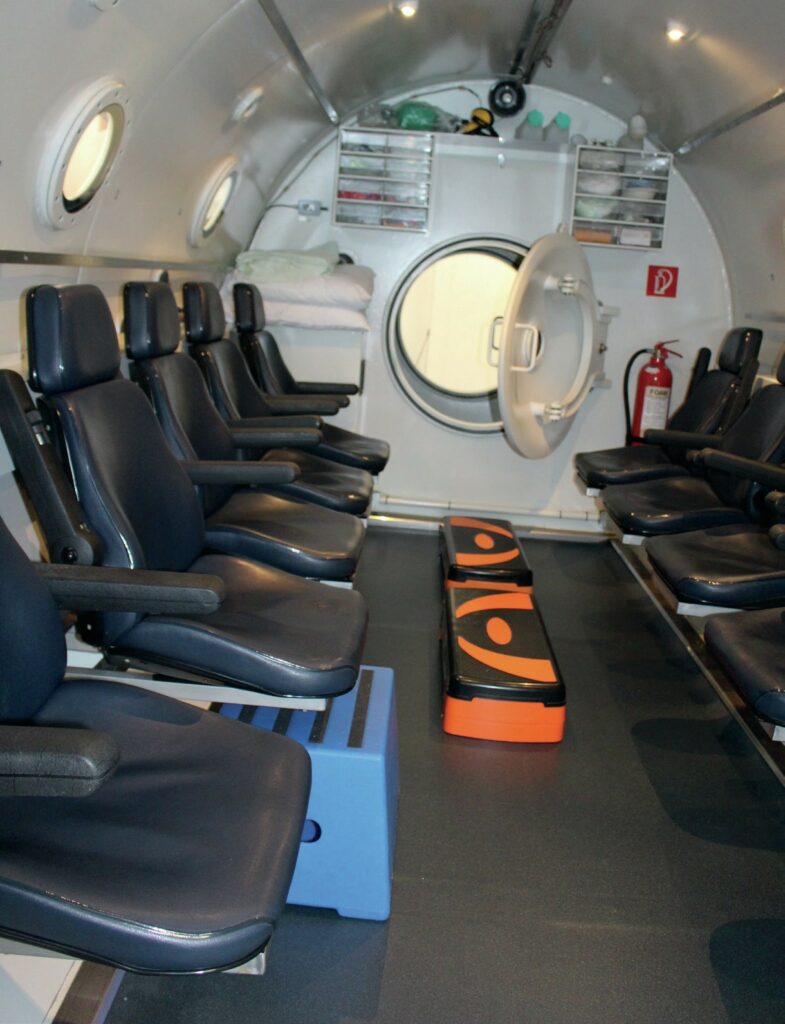
The hyperbaric chamber at the Midlands Diving Chamber has one of the deepest depth ratings of any chamber in the UK, which means they can run any DCI therapy table they need to, but can also provide dry dives to 50m.
Serving a Diverse Diving Community
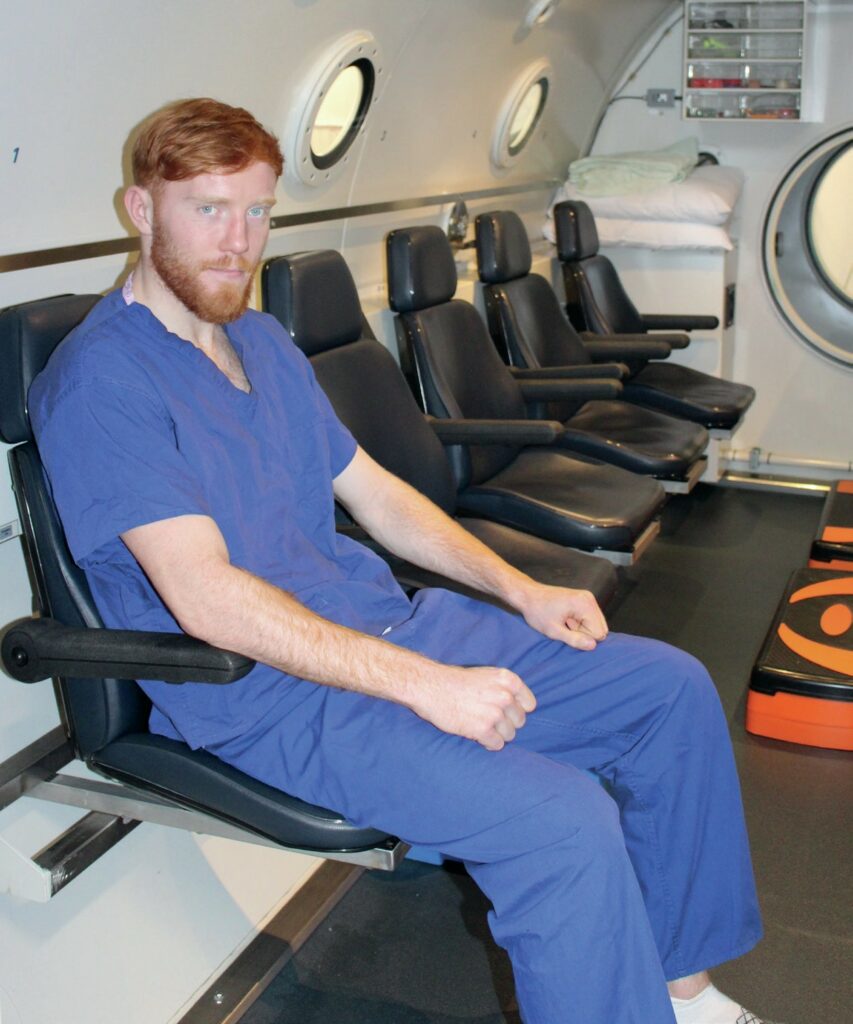
One of the questions often asked is, ‘why is there a chamber in the Midlands?’. That is easy to answer – because it is one of the most highly populated areas of active divers, if you look at the amount who live in this region, and Stoney Cove, one of the UK’s busiest inland dive sites, is just down the road.
Dedicated Staff and Military Backgrounds
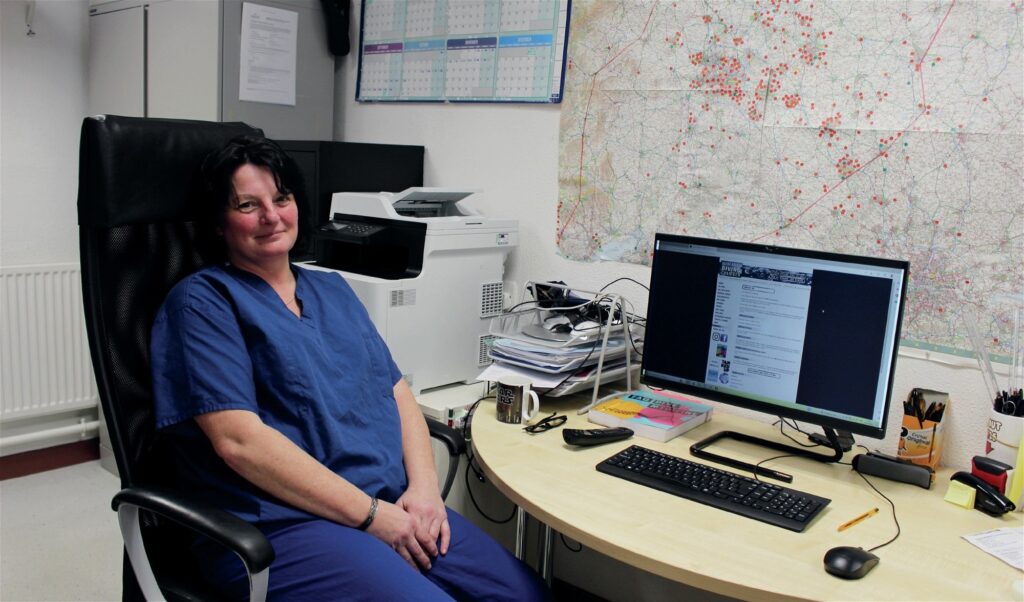
There are three permanent employees at the Midlands Diving Chamber, and a number of contractors. Chamber manager Sally Cartwright will often be one of the first people you meet on arrival at the chamber. You know you are in good hands as nearly all of the staff at the MDC are scuba divers themselves, with the chamber staff coming from military and commercial diving backgrounds.
Committed to Diver Care and Free Services
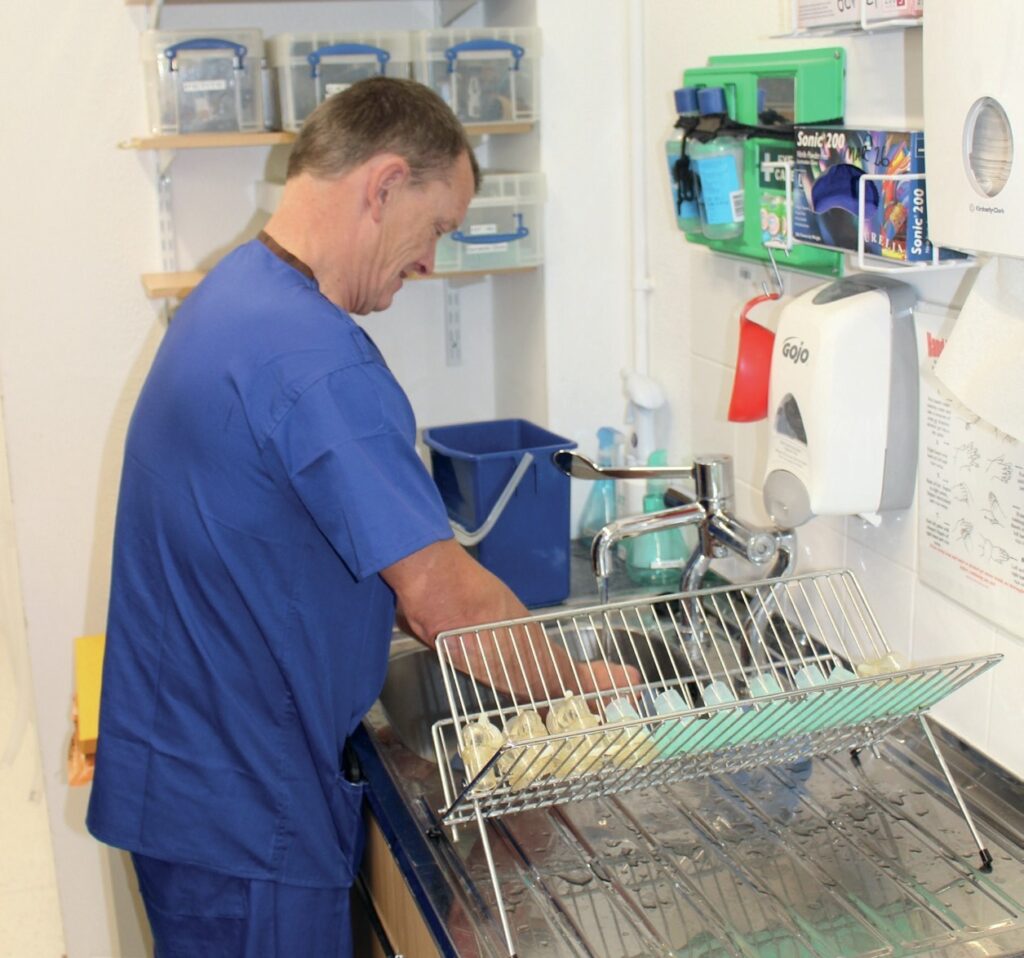
The Midlands Diving Chamber is funded by the NHS, and as such, regardless of the situation, MDC has never – and will never – charge divers for its services or advice. Sally explained: “In fact, MDC has in the past and will continue to provide treatment to divers who do not qualify for NHS funding – we will never turn away a diver in need.”
24-Hour Helpline and Support
The Midlands Diving Chamber runs a 24-hour worldwide helpline, providing support to dive clubs, shops and instructors as well as individual divers on all aspects of diving. As Sally explained, “we are very happy to provide free telephone and email consultations regarding all aspects of diving, from advice on DCI/DCS, diving on medication to problems when diving abroad – in fact, whatever your question, we are here to help 24 hours a day, 365 days a year.”
Immediate Action and Expert Advice
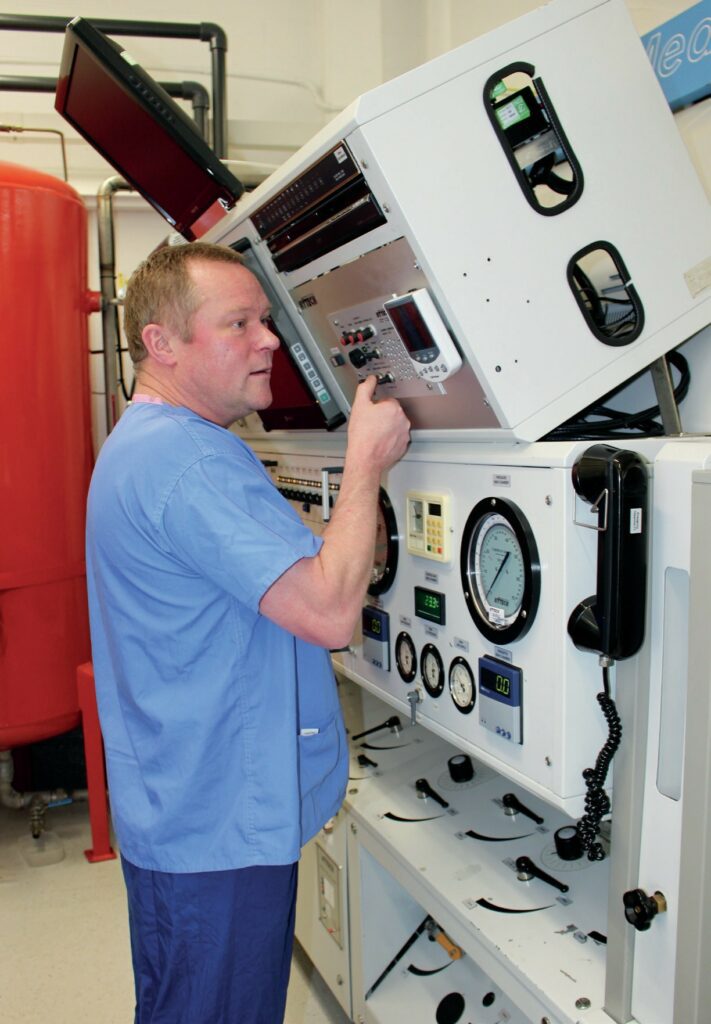
The MDC have a landline and an emergency mobile number, and it will be one of the permanent team members who answer the phone. The Midlands Diving Chamber will give fully qualified and diver-friendly advice on all diving medical issues, and offer many services to scuba divers to help them learn more about hyperbaric medicine, decompression sickness, dive medicals, general dive medicine and other issues of general interest to the diving industry.
Prompt Treatment for Symptoms
Sally said: “We have many people ringing us up with general queries, and often they have minor niggles that they are concerned about.
“We get people weeks down the line who have had tingles, and they have finally decided to call. You get quicker results by pressing patients quick than someone who has had symptoms for weeks. The longer you leave it, the more re-treats you need to combat the symptoms, so don’t delay – we are on-site within an hour to conduct recompression treatments.
Overcoming Denial and Seeking Help
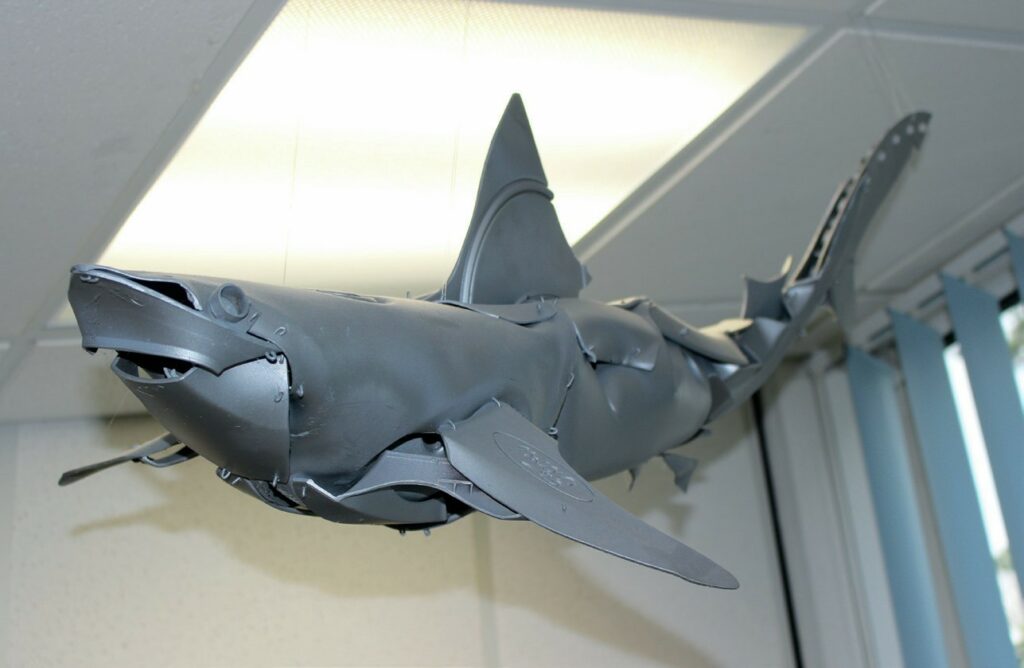
Sally continued: “The main message to get out is ‘don’t sit and ponder on it, just ring up and ask the question’. If an ache or a pain was not there before a dive, then make that call. It is better to be safe than sorry.
“The worst thing is denial – there is still a stigma associated with decompression illness, and divers are seemingly reluctant to admit they have an issue. Not all divers who get DCI have made a rapid ascent, or had some other problem, or done ‘something wrong’. Many have dived well within the limits of their dive computer profiles and still got a hit – it is all down to personal physiology.
HBOT treatment
Hyperbaric Oxygen Therapy is a non-invasive medical treatment which involves breathing 100% oxygen at an increased pressure, through the use of a hyperbaric chamber. Breathing 100% oxygen under pressure allows oxygen to dissolve into the blood plasma, when this occurs, increased amounts of oxygen can be delivered to injured tissues.
The Midlands Diving Chamber offers HBOT treatment for enhancement of healing in selected problem wounds, exceptional blood loss (anaemia), osteomyelitis (refractory), radiation tissue damage (osteoradionecrosis), and skin grafts and flaps (compromised). NB: These are private-only, only scuba divers suffering from DCI, or air or gas embolism, are treatable for free under the NHS. got a hit – it is all down to personal physiology.
“We see a lot of denial. A lot of miss-diagnosis abroad. Tiredness. They can’t function at work. Aching. A lot of joint pain. A lot of disorientation. Brain fog. Memory loss. Basically, if you have been diving in 72 hours and you have any of these symptoms, or anything else out of sorts, you should be picking up that phone and making a call. If more time has passed and you are having some of these issues, pick up the phone – it doesn’t matter how long it is, make that call.
“That’s what we are here to do. It’s not like pressing the emergency button, or blue lights, helicopters coming to get you. Doesn’t work like that. You can drive yourself in, although we usually advise you to get someone to drive you here. It is all very calm and collected. If you like a bit of banter, you’ll get the banter, it’s all very relaxed. There is none of this rushing around ‘oh, you have DCI’.”
Treatment Process and Duration
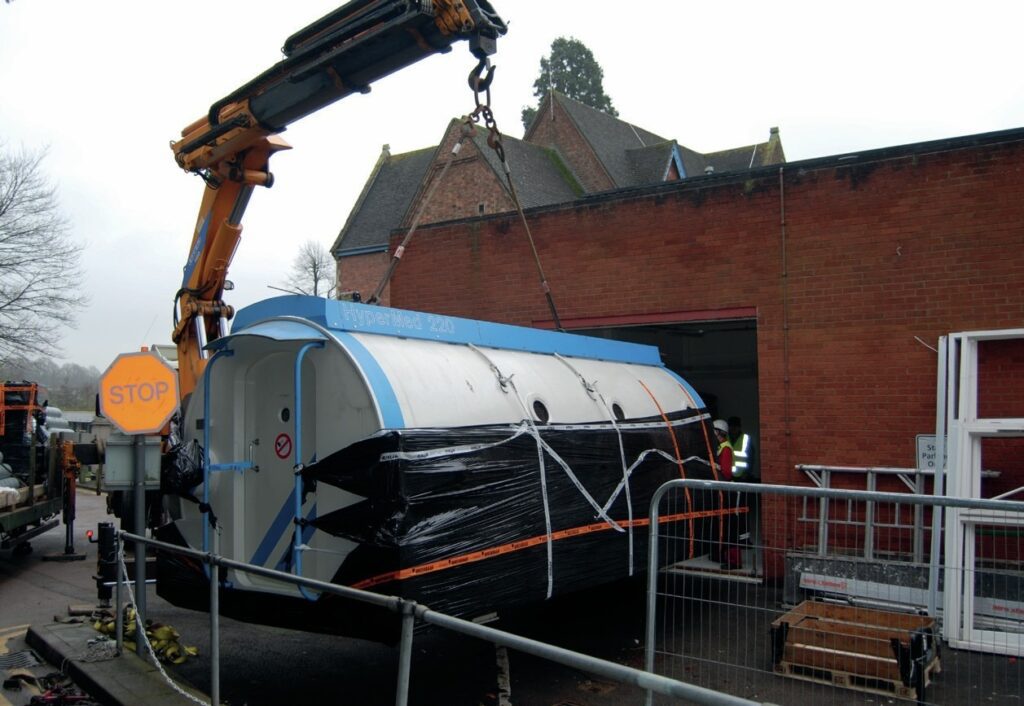
Asked about length of treatment, Sally said it very much depends on each case. However, she explained: “There is a set profile, which is your Royal Navy Table 62, which we use for a diver. We can run with two extensions on that. So you’ll do three 20 minutes of oxygen, with five-minute air breaks. At each air break phase, we will assess the patient’s symptoms. Are you happy? What stage are your symptoms at – have they improved, have they got worse.
“If the symptoms are still there, and the doctor thinks an extension will help, then we will do another 20 minute session on oxygen at 18m. We can do up to two extensions, which mean you get five sessions in total.
Then they will do half an hour to get up to 9m, an hour at 9m, another hour at 9m, and then half an hour and you are on your way out. So it can be up to five hours 40 minutes – we say six hours, as it is just easier to remember that. It just varies on those extensions.
“Any re-treats are then run on a Table 66, which is a 14m table. We generally put them in with the other HBOT patients. They do one hour and 40 minutes on average, so you do 90 minutes total on oxygen, with your travel time either side, and the five-minute air breaks in between.”
Early Treatment for Optimal Results
She concluded: “Any residual symptoms will require more treatment. Until the symptoms are completely gone, or you are stable, and that’s the best we can hope for – it all depends on how long the person has left it.”
Taking Action for Diver's Well-being
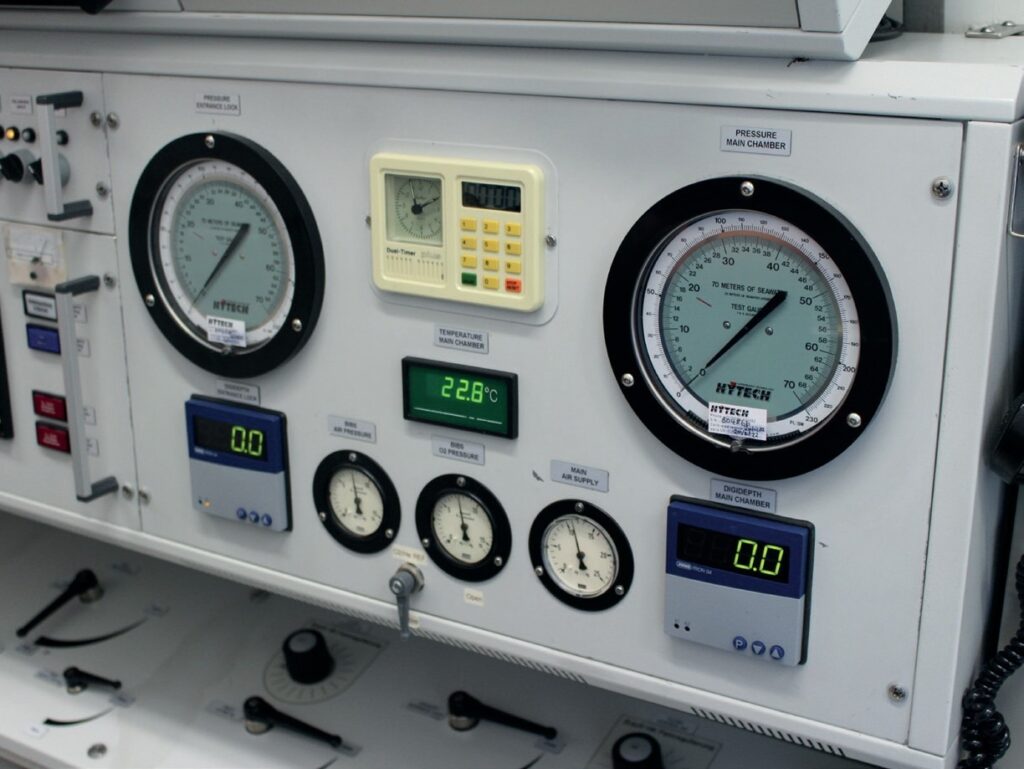
So the big take-away from this visit – and not the Chinese takeaways that those in for a DCI treatment are treated to on an evening! – is that if you have been diving, whether that was a few hours, a few days, or even a few weeks, and you have any odd feelings or issues that were not there before, then get on the phone and speak to an expert.
It may well be nothing to worry about – but if it is DCI, the benefits of getting treated sooner rather than later are clearly apparent.
Dry dives
The Midlands Diving Chamber also conducts dry dives down to 40m or 50m, which is the perfect group event for dive clubs and dive centres.
The chamber can take nine divers, plus a tender. The divers get a full lecture on arrival – as Sally says, ‘we don’t just stick them in the chamber, so it makes a full evening’. The divers even get a T-shirt saying they have done a dry dive to 50m!
She continued: “Once in the chamber, there are various games being played, such as spell check, and several props go on the dive, such as pieces of neoprene, to show compression, and ping pong balls – they are the best, they implode and go bang, and everyone jumps, which sets off the giggles from the narcosis, and that’s really funny to watch from the outside. Some people take their GoPros in and film what happens, and post it on YouTube.
“It is a really great way of getting everyone to bond as a group. Even if they are all from the same dive club or centre. We all know there can be politics in dive clubs, as we know. When they go in there, there’s no politics, they all just sit and giggle. You see changes in the groups once they have been in.”
The cost is £30 per diver for the 40m dive and £40 per diver for the 50m dive. A minimum of six divers is needed to dry dive, and divers must be at least 18 years old for insurance purposes.
Midlands Diving Chamber
This article was originally published in Scuba Diver UK #70.
Subscribe digitally and read more great stories like this from anywhere in the world in a mobile-friendly format. Link to the article
